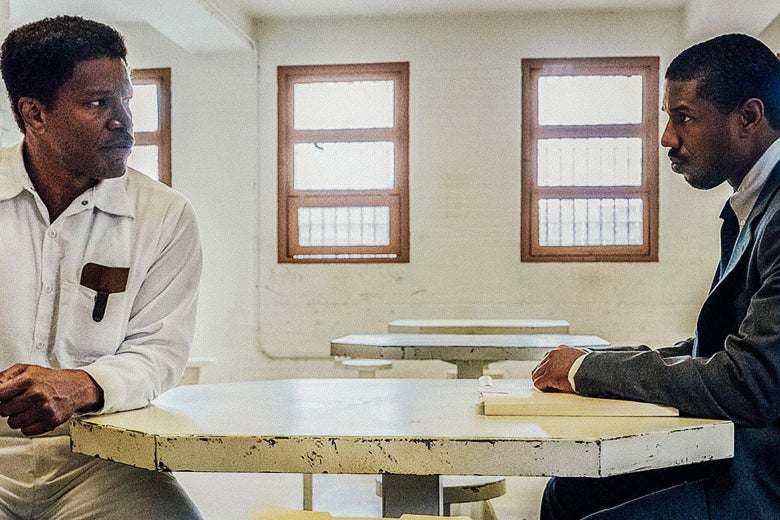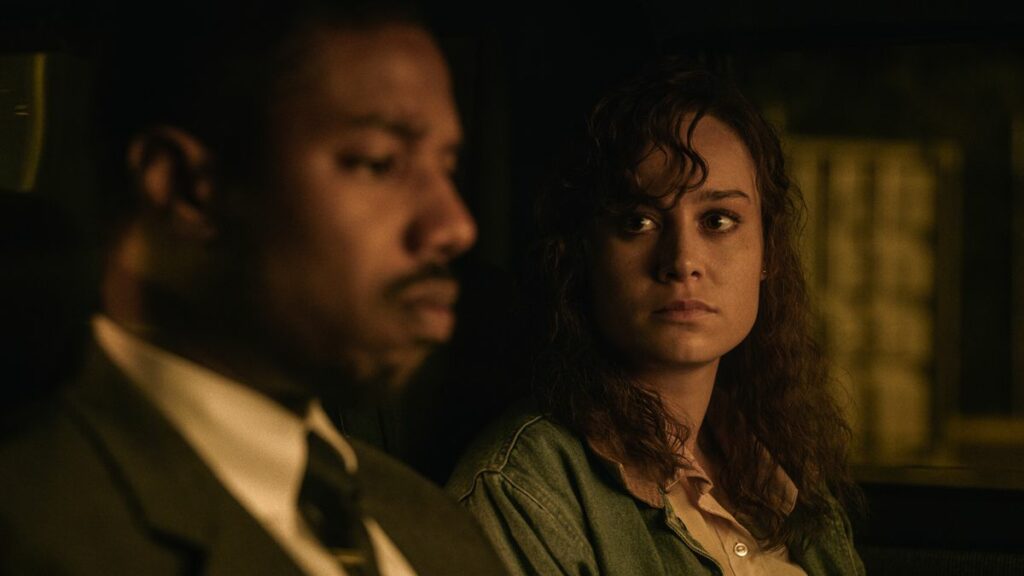Just Mercy (2019)

DIRECTOR: Destin Daniel Cretton
CAST: Michael B. Jordan, Jamie Foxx, Brie Larson, Rafe Spall, Tim Blake Nelson, Rob Morgan, O’Shea Jackson
REVIEW:
Just Mercy is an example of an entry in a well-traversed genre—the “based on a true story” courtroom/social justice drama—that doesn’t transcend its expected tropes but elevates them. It’s a well-made, well-acted, stirring, compelling, and affecting docudrama telling the story of a true miscarriage of justice that forces viewers to face the uncomfortable question of how many other similar stories have gone untold.
In 1987 Alabama, Walter McMillan (Jamie Foxx) is arrested for the brutal murder of an eighteen-year-old white girl. Despite the “evidence” against him being flimsy at best—the state’s case hinges on the testimony of convicted felon Ralph Myers (Tim Blake Nelson) who obtained a lesser sentence for himself after claiming to have witnessed the crime—McMillan is convicted and sentenced to death row. Five years later, idealistic young Harvard lawyer Bryan Stevenson (Michael B. Jordan) arrives on a politically unpopular crusade to provide legal services for death row inmates (many of whom received poor representation during their trials). After poring over the details of McMillan’s case—predominantly realizing that Myers’ testimony was riddled with plot holes and that other contrary witnesses were ignored—Bryan becomes convinced of McMillan’s innocence and, aided only by anti-death penalty activist Eva Ansley (Brie Larson), he determines to bring him home to his family. After taking up McMillan’s cause, however, Bryan finds how pervasive are the forces arrayed against him.
Just Mercy falls into the “crusading lawyer overturning a miscarriage of justice” subgenre of the courtroom drama. As expected, racism is a significant factor (the movie takes place in Harper Lee’s hometown, and her magnum opus To Kill a Mockingbird is explicitly referenced). With real-life activist Bryan Stevenson as its hero, Just Mercy dodges the “white savior” trope while also avoiding vilifying every white character (Brie Larson’s Eva Ansley, who is as impassioned and dedicated to the cause as Bryan, stands as a counter-example to racist and corrupt local officials). The movie takes pains to not only highlight Walter McMillan’s true story, but also call attention to the all-too-often racially and economically biased application of the death penalty. We get uncomfortable moments such as an execution by electric chair (the presentation is spare and low-key and avoids graphic details but has enough docudrama immediacy to be disturbing). Bryan and Eva are subjected to various forms of intimidation, some overt (a bomb threat made to Eva’s family), others more veiled, albeit thinly, such as a tense traffic stop by belligerent cops with itchy trigger fingers, and an earlier scene in which Bryan is degraded and humiliated by being frivolously subjected to a strip search. Destin Daniel Cretton helms the proceedings in low-key straightforward fashion, avoiding an excess of melodrama and letting the facts speak for themselves, many of which are damning enough to stoke the flames of moral outrage as it becomes increasingly obvious how both flimsy and corrupt the case against McMillan was.

Strong performances abound. Jamie Foxx provides a reminder (not that one should be needed after his Oscar-winning portrayal of Ray Charles in 2005’s Ray) that he can be a capable dramatic actor, but Foxx’s role is a supporting one. The central spotlight firmly belongs to Michael B. Jordan, who does a solid job playing Bryan Stevenson as a dogged crusader for social justice who is not dissuaded by either personal threats or professional setbacks. Brie Larson (looking nothing like Captain Marvel) gives a strong supporting turn, and the movie avoids any cliches like a romantic subplot between Bryan and Eva (she’s married with a husband and children). Tim Blake Nelson (as the convict whose flimsy and, we eventually learn, coerced testimony sent McMillan to prison) and Rob Morgan (as a PTSD-riddled fellow death row inmate) make impressions in limited screentime. Rafe Spall provides the uncooperative, obstructionist local official, though his character is more conflicted and less cartoonishly villainous than what we might expect in this kind of movie; the real “villain”, insofar as there is one, is Michael Harding’s corrupt Sheriff who was more concerned with finding a scapegoat to close a case and appease an outraged community than with conducting a proper investigation, and willing to resort to unscrupulous methods to do so, but his role is fairly small.
Just Mercy doesn’t transcend the expected tropes of the kind of movie it is—we follow what is overall a fairly predictable narrative trajectory—but it’s one of the stronger entries in its genre in recent memory, well-crafted and compelling with a surfeit of strong performances. In its “David vs. Goliath” story of one man striking a blow for social justice, it achieves a crowd-pleasing element, but also raises the uncomfortable question of how many other Walter McMillans never get their day in the spotlight.
***